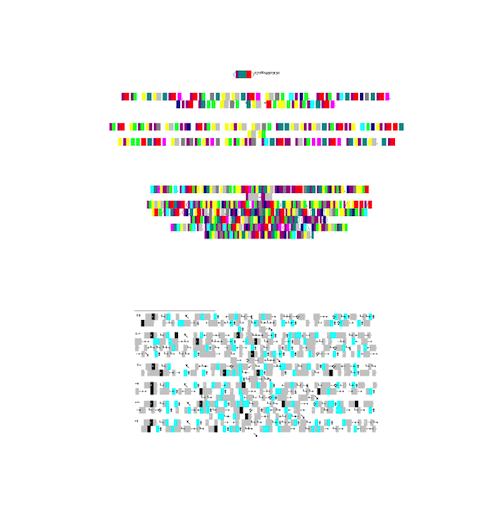Outside the Held Standard: Douglas Piccinnini's Flag
The other day we made mention of Well Greased Press in a post about CLMP extending their membership--looking closely now, closely at Douglas Piccinnini's Flag, in fact, we can make out some words in the chromaglyph. And it's fascinating stuff, rousing both poetry as disreputable art matter and specific conceptual projects like Hannah Weiner's Code Poems. Piccinnini has posted the introduction to the book on his blog, penned by Well Greased editor and publisher Judah Rubin as an entrée for poems that may not come across directly as such. We'd like to excerpt Rubin's piece here:
...Is the automatic formation of the poem to be driven into the textual realm, into the marker, or will it code itself to record a symbolic order at once for and extraneous to itself--marking the excess of the freakish addition to language–to stand against and entreat reading to shudd(tt)er at possibility, as per Robert Grenier, of reading while shutting down the pleasure of referential non-reference as in the Noigrandres?
Language stands in need of a notated quietism in apparatus, apparenthesis. It needs its non-space. Let it leave off when approached with sociality as necessary, as responsible text. Best to allow it to present the reader with the same dilemma as early attempts at mapping shorelines gave cartographers: a happy and impossible question. In presenting asymptotic dimensions, there is an inherent impossibility in the replacement of solid ground for water. When/where does land end? But to this, the poem may demand a cancellation of language by pointing beyond itself in itself and turn away from the space of literature to an excess encoded on the body of the poem itself. The uniformity of flattened, alphabetic semantic logos is a failure, markedly for its battering of that language that is actually private, private to itself, generating only a border of pure spec(tra)(u)lation. Language must need encode itself as memory does, as the de/re-fragmented disk repieces the Osiric tearing of its body of thought.
Poetry is often spoken of as a necessarily correspondent or social medium – even, per Blanchot, again that we are always writing for a somebody’s summed body. That the conceptual should leave a space to discuss, to debate, to mark out and stake a position. But letting poetry slip into disrepair, recognizing a happy paucity of place, I would like to think of Flag as being part of what is, instead, a leaving off, a creation of an apart/aportion purporting to wave, flag, hail, but, then, instead, creates an autoaffective space for itself and does not invite any more than it wards off, stands at the mid-point of a fundamentally Whitmanian dialectical space (i.e. leaves / left / growth { } flagged / mast-bound / death) that may help us to understand the recuperation of a space for interiorized directive that this book offers its reader.
[. . .]
This work dissolves under the weight of the poems’ expectation—their gesture is one outside the held standard, apportioning the flattened field to the aphasia of graphic interface. These are poems that touch themselves and retreat from contact. They stand at a remove from the body, from speech, from writing and refuse contact with patrimony that would seek to graft it to the word-trunk. This is writing that finally refuses to speak.

Piccinnini will enact a vocal presence, however, with fellow Well Greasers Karen Weiser (Dear Pierre) and Lewis Freedman (Hold the Blue Orb, Baby) at Unnameable Books in Brooklyn on August 20, 8:00 PM. Above: an image from Flag's interior. Way above: the author at work. Maybe he was writing poems for his chap Soft or some for Lana Turner? Also keep your eyes out for Piccinnini's first full-length, Blood Oboe, forthcoming from Omnidawn.


